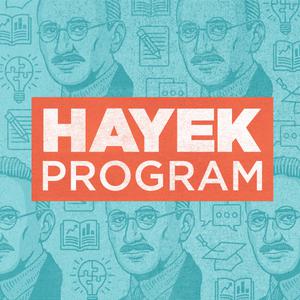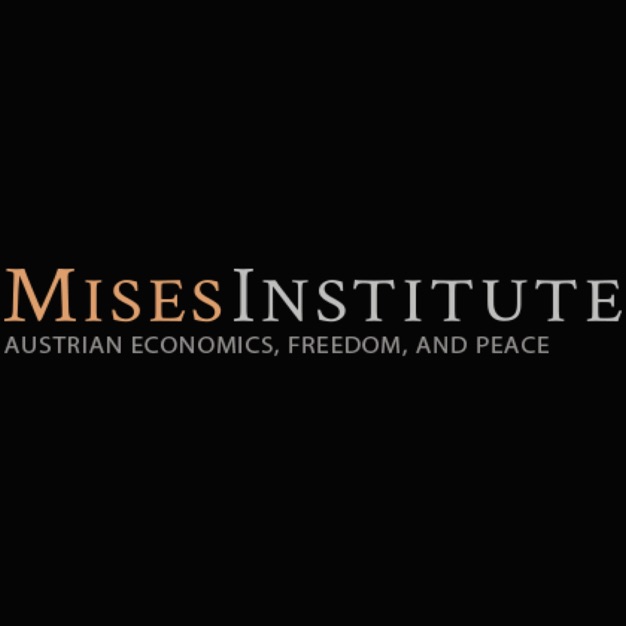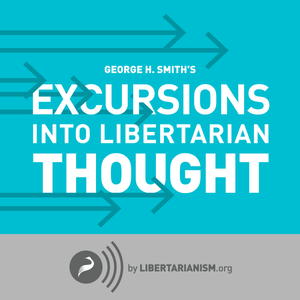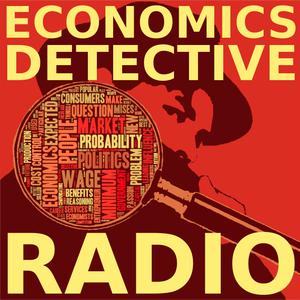
Hayek Program Podcast
F.A. Hayek Program for Advanced Study in Philosophy, Politics, and Economics
The Hayek Program Podcast includes audio from lec…
- 1 hour 27 minutes"Freedoms Delayed" Book Panel
On this episode, we’ll hear a book panel discussion on Timur Kuran’s book, Freedoms Delayed: Political Legacies of Islamic Law in the Middle East (Cambridge University Press, 2023). In his comments, Timur provides an overview of his book, highlighting the Middle East's struggle with repressiveness, the challenges of fostering a liberal civil society, and the historical role of Islamic legal institutions. The panel is moderated by Peter J. Boettke, and they are joined on the panel by:
- Mark Koyama,* Associate Professor of Economics at George Mason University, Senior Fellow with the F.A. Hayek Program for Advanced Study in Philosophy, Politics, and Economics at the Mercatus Center, and co-author of How the World Became Rich (2022) and Persecution and Toleration (2019).
- James Robinson, Professor of Political Science at the Harris School of Public Policy at the University of Chicago, The Reverend Dr. Richard L. Pearson Professor of Global Conflict Studies, Institute Director at the Pearson Institute for the Study and Resolution of Global Conflicts, and he has numerous books including The Narrow Corridor (2019) and Why Nations Fail (2013).
- Jennifer Brick Murtazashvili, Founding Director of the Center for Governance and Market and Professor at the University of Pittsburgh Graduate School of Public and International Affairs, and co-author of Land, the State, and War: Property Institutions and Political Order in Afghanistan (2021).
Timur Kuran is a Turkish-American economist and political scientist. He is a Professor of Economics and Political Science and the Gorter Family Professor of Islamic Studies at Duke University. He has published multiple books including The Long Divergence: How Islamic Law Held Back the Middle East (2011) and Private Truths, Public Lies: The Social Consequences of Preference Falsification (1997).
*Mark Koyama's comments were recorded separately
If you like the show, please subscribe, leave a 5-star review, and tell others about the show! We're available on Apple Podcasts, Spotify, Amazon Music, and wherever you get your podcasts.
Virtual Sentiments, our new podcast series from the Hayek Program is now streaming! Subscribe today and listen to season two, now releasing!
Follow the Hayek Program on Twitter: @HayekProgram
Learn more about Academic & Student Programs
Follow the Mercatus Center on Twitter: @mercatus
CC Music: Twisterium
1 May 2024, 7:00 am - 49 minutes 16 seconds"Living Better Together" — On Community Resilience
On this episode of the Hayek Program Podcast, we continue the Living Better Together miniseries, featuring select authors of Living Better Together: Social Relations and Economic Governance in the Work of Ostrom and Zelizer (Palgrave Macmillan, 2023) and hosted by its coeditor, Stefanie Haeffele.
Joining us today are Anne Hobson and Laura Grube. Together they explore the complexities of institutional diversity, community recovery, and crisis resilience through the lenses of Ostrom and Zelizer. Laura’s chapter focuses on community recovery following Hurricane Katrina and Superstorm Sandy and emphasizes the importance of local, community-driven solutions following disasters. Anne’s chapter explores the role of remittances in Cuba and how these financial supports act as economic circuits that maintain and strengthen familial and social bonds across geographical distances. Both emphasize the importance of social relations in community resilience.
Laura Grube is an Associate Professor of Economics at Beloit College. She is an alum of the Mercatus PhD Fellowship. Check out her chapter, "Institutional Diversity in Social Coordination Post-disaster."
Anne Hobson earned her PhD in Economics from George Mason University and now works in public policy. She is an alum of the Mercatus MA Fellowship. Check out her chapter, "Beyond Relief: Understanding the Cuban Diaspora's Remittance-Sending Behavior."
Recommended Works: Robert Wise’s “Learning from Strangers,” Barbara Czarniawska’s “Narratives in Social Science Research,” Jieun Baek’s “North Korea’s Hidden Revolution: How The Information Underground is Transforming a Closed Society,” Tom Gjelten’s “Bacardi and the Long Fight for Cuba,” and “Cuba and the Cameraman.”
If you like the show, please subscribe, leave a 5-star review, and tell others about the show! We're available on Apple Podcasts, Spotify, Amazon Music, and wherever you get your podcasts.
Virtual Sentiments, our new podcast series from the Hayek Program is now streaming! Subscribe today and listen to season two, now releasing!
Follow the Hayek Program on Twitter: @HayekProgram
Learn more about Academic & Student Programs
Follow the Mercatus Center on Twitter: @mercatus
CC Music: Twisterium
17 April 2024, 7:00 am - 59 minutes 36 secondsPeter Boettke & David Beito on the New Deal's War on the Bill of Rights
On this episode of the Hayek Program Podcast, Peter Boettke chats with David Beito on his latest book, The New Deal’s War on the Bill of Rights: The Untold Story of FDR’s Concentration Camps, Censorship, and Mass Surveillance (Independent Institute, 2023). Beito begins by recounting his early interests in classical liberalism, his association with then fellow student, Nancy MacLean, and his work on tax revolts and mutual aid societies. He then discusses FDR’s ideological motivations and his pragmatic approach to politics, critiques FDR’s encroachment on civil rights, including his approval of Japanese concentration camps, and explains the contrast between FDR’s legacy amongst historians and economists.
David T. Beito is Emeritus Professor of History at the University of Alabama and a Senior Fellow at the Independent Institute in California. He is the author of five books including From Mutual Aid to the Welfare State: Fraternal Societies and Social Services, 1890-1967 (The University of North Carolina Press, 2000).
If you like the show, please subscribe, leave a 5-star review, and tell others about the show! We're available on Apple Podcasts, Spotify, Amazon Music, and wherever you get your podcasts.
Virtual Sentiments, our new podcast series from the Hayek Program is now streaming! Subscribe today and listen to season two, now releasing!
Follow the Hayek Program on Twitter: @HayekProgram
Learn more about Academic & Student Programs
Follow the Mercatus Center on Twitter: @mercatus
CC Music: Twisterium
3 April 2024, 7:00 am - 47 minutes 57 seconds"Living Better Together" — On Women and the Family
On this episode of the Hayek Program Podcast, we kickoff the Living Better Together miniseries, featuring select authors of Living Better Together: Social Relations and Economic Governance in the Work of Ostrom and Zelizer (Palgrave Macmillan, 2023) and hosted by its coeditor, Stefanie Haeffele.
Joining us today are Bri Wolf and Jayme Lemke. Starting the discussion, they reflect on their path to joining the book project and elaborate on the insights they provide in their chapters. Together, they explore how Ostrom and Zelizer's approaches illuminate the complex relationships between societal norms, family dynamics, and broader social systems, advocating for a multidisciplinary and global perspective on these themes.
Bri Wolf is an Assistant Professor of Political Theory at James Madison College at Michigan State University. She is an alum of the Mercatus Adam Smith Fellowship. Learn more about her experience as a fellow here, and check out her chapter, "Bringing the Family Back In: Political Economy and the Family in Liberal Theory."
Jayme Lemke is Senior Research Fellow and a Senior Fellow with the F. A. Hayek Program for Advanced Study in Philosophy, Politics, and Economics at the Mercatus Center at George Mason University. She is an alum of the Mercatus PhD Fellowship. Check out her chapter, "Polycentric Institutions of Intimacy."
Listen to the lecture that started it all, "'Why and How Do Social Relations Matter for Economic Lives?' with Viviana Zelizer"
If you like the show, please subscribe, leave a 5-star review, and tell others about the show! We're available on Apple Podcasts, Spotify, Amazon Music, and wherever you get your podcasts.
Virtual Sentiments, our new podcast series from the Hayek Program is now streaming! Subscribe today and listen to season two, now releasing!
Follow the Hayek Program on Twitter: @HayekProgram
Learn more about Academic & Student Programs
Follow the Mercatus Center on Twitter: @mercatus
CC Music: Twisterium
20 March 2024, 7:00 am - 1 hour 4 minutesEnvironmental Economics — Governing the Global Fisheries Commons
Welcome back to the Environmental Economics series, hosted by Jordan Lofthouse. On this episode, Jordan interviews Pablo Paniagua Prieto and Veeshan Rayamajhee on their co-authored work, "Governing the Global Fisheries Commons." On this episode and in their article, they address the challenges of overfishing and the depletion of global fisheries. They critique one-size-fits-all solutions, advocating for an approach that recognizes overfishing as a complex set of interconnected problems across various jurisdictions. Drawing from Elinor Ostrom's insights, they propose combining market-based strategies, such as individual transferable quotas, with government interventions like removing harmful subsidies, and highlight the importance of local knowledge, community participation, and multi-layered solutions to effectively govern the global fisheries commons.
Pablo Paniagua Prieto is an economist and engineer from Politecnico di Milano and Professor of Political Economy at Universidad del Desarrollo in Santiago, Chile. Pablo is an alum of the Mercatus Adam Smith Fellowship.
Veeshan Rayamajhee is an Assistant Professor of Economics in the Department of Agribusiness and Applied Economics at North Dakota State University and a faculty fellow at the Center for the Study of Public Choice and Private Enterprise. Veeshan is an alum of the Mercatus Adam Smith Fellowship.
Check out Jordan Lofthouse's work.
If you like the show, please subscribe, leave a 5-star review, and tell others about the show! We're available on Apple Podcasts, Spotify, Amazon Music, and wherever you get your podcasts.
Virtual Sentiments, our new podcast series from the Hayek Program is now streaming! Subscribe today and listen to season two, now releasing!
Follow the Hayek Program on Twitter: @HayekProgram
Learn more about Academic & Student Programs
Follow the Mercatus Center on Twitter: @mercatus
CC Music: Twisterium
6 March 2024, 8:25 am - 1 hour 41 seconds"Better Money: Gold, Fiat, or Bitcoin?" Book Panel
On this episode, we’ll hear a book panel discussion on Lawrence H. White’s book, Better Money: Gold, Fiat, or Bitcoin? (Cambridge University Press, 2023). In his opening remarks, Larry gives an overview of his book which details the history of money, explains how the gold, fiat, and bitcoin standards work, and aims to bridge the gap between the gold standard and cryptocurrency advocates. He covers issues of supply constraints, volatility, inflation, and common misconceptions for each of the standards. Moving forward, he explores potential forms for better monetary standards including non-governmental monetary systems. The panel is moderated by Peter J. Boettke, and they are joined on the panel by:
- Joshua Hendrickson, Associate Professor of Economics and Chair of the Department of Economics at the University of Mississippi, and author of numerous publications including “The Political Economy of Bitcoin” (Economic Inquiry, 2015)
- Nicolás Cachanosky, Associate Professor of Economics and Director of the Center for Free Enterprise at The University of Texas at El Paso, Senior Fellow at AIER, Fellow of the UCEMA Friedman-Hayek Center for the Study of a Free Society, and co-author of Austrian Capital Theory: A Modern Survey of the Essentials (2019)
- David Beckworth, Senior Research Fellow at the Mercatus Center at George Mason University, former international economist at the US Department of the Treasury, and host of the Mercatus Center’s Macro Musings Podcast
Lawrence H. White is a Professor of Economics at George Mason University and a Distinguished Senior Fellow with the F. A. Hayek Program for Advanced Study in Philosophy, Politics, and Economics at the Mercatus Center at George Mason University. Larry has published multiple books including The Clash of Economic Ideas: The Great Policy Debates and Experiments of the Last Hundred Years (Cambridge University Press, 2012).
If you like the show, please subscribe, leave a 5-star review, and tell others about the show! We're available on Apple Podcasts, Spotify, Amazon Music, and wherever you get your podcasts.
Virtual Sentiments, our new podcast series from the Hayek Program is now streaming! Subscribe today and listen to season two, releasing now!
Follow the Hayek Program on Twitter: @HayekProgram
Learn more about Academic & Student Programs
Follow the Mercatus Center on Twitter: @mercatus
CC Music: Twisterium
21 February 2024, 8:00 am - 1 hour 3 minutesMikayla Novak & Seth Kaplan on Fragile Neighborhoods
Mikayla Novak interviews author Seth Kaplan on his latest book, Fragile Neighborhoods: Repairing American Society, One Zip Code at a Time. In this book, he addresses the decline in American neighborhoods characterized by rising crime, school violence, family disintegration, addiction, alienation, and despair. Kaplan applies his insights to the American context, emphasizing the importance of relationships and social dynamics in building healthy societies. He advocates for neighborhood-based solutions, highlighting the role of 'community quarterbacks' or social entrepreneurs in organizing local improvements. In this conversation, Kaplan also touches on the impacts of migration, the importance of practical approaches, the characteristics of robust neighborhoods, and emphasizes the need for more intentional community-building efforts to improve societal health and individual well-being.
Seth D. Kaplan is a leading expert on fragile states. He is a Professorial Lecturer in the Paul H. Nitze School of Advanced International Studies at Johns Hopkins University, Senior Adviser for the Institute for Integrated Transitions, and consultant to multilateral organizations such as the World Bank, U.S. State Department, U.S. Agency for International Development, and OECD as well as developing country governments and NGOs. Kaplan is a former visiting fellow with the Mercatus Center’s Program on Pluralism and Civil Exchange.
If you like the show, please subscribe, leave a 5-star review, and tell others about the show! We're available on Apple Podcasts, Spotify, Amazon Music, and wherever you get your podcasts.
Virtual Sentiments, our new podcast series from the Hayek Program is now streaming! Subscribe today and listen to season two, releasing now!
Follow the Hayek Program on Twitter: @HayekProgram
Learn more about Academic & Student Programs
Follow the Mercatus Center on Twitter: @mercatus
CC Music: Twisterium
7 February 2024, 8:00 am - 1 hour 24 minutes"In Search of Monsters to Destroy" Book Panel
On this episode, we’ll hear a book panel discussion on Christopher J. Coyne’s book,In Search of Monsters to Destroy: The Folly of American Empire and the Paths to Peace (Independent Institute, 2023). In his comments, Coyne challenges the notion that the US military is necessary for global order, explaining that without the US as the global police force chaos will not overtake the world, and questions the efficacy and morality of a militaristic, top-down approach to global conflict. Coyne breaks down the history of the American empires into three phases: continental expansion, overseas imperialism, and global hegemony, and describes the features of the present-day American empire and the interventionist mindset. He argues that foreign intervention and the effort to export democracy to other nations by illiberal means can only lead to illiberal ends. A liberal empire is ultimately illiberal. He calls for reimagining our understanding of peace as a community-driven process, emphasizing the role of human imagination in peacemaking. The panel is moderated by Stefanie Haeffele, and they are joined on the panel by:
- William Easterly, Professor of Economics at New York University, Co-director of the NYU Development Research Institute, and author of three books including The White Man’s Burden: Why the West’s Efforts to Aid the Rest Have Done So Much Ill and So Little Good (2006)
- Ginny Choi, Senior Program Director of Academic & Student Programs, Senior Fellow with the F. A. Hayek Program for Advanced Study in Philosophy, Politics, and Economics, Senior Research Fellow at the Mercatus Center at George Mason University, and co-author of Do Markets Corrupt Our Morals? (2019)
- Alexandre Christoyannopoulos, PGT Programme Leader and a Reader in Politics and International Relations at Loughborough University, and author or co-editor of five books including Tolstoy's Political Thought: Christian Anarcho-Pacifist Iconoclasm Then and Now (2021)
Christopher Coyne is associate director of the F. A. Hayek Program for Advanced Study in Philosophy, Politics, and Economics and F. A. Harper Professor of Economics at the Mercatus Center at George Mason University. He is also a Professor of Economics at George Mason University.
If you like the show, please subscribe, leave a 5-star review, and tell others about the show! We're available on Apple Podcasts, Spotify, Amazon Music, and wherever you get your podcasts.
Virtual Sentiments, our new podcast series from the Hayek Program is now streaming! Subscribe today and listen to season two, releasing now!
Follow the Hayek Program on Twitter: @HayekProgram
Learn more about Academic & Student Programs
Follow the Mercatus Center on Twitter: @mercatus
CC Music: Twisterium
24 January 2024, 8:35 am - 53 minutes 34 secondsPeter Boettke & Bryan Cheang on Unveiling Liberalism in Southeast Asia
Peter Boettke sits down with Bryan Cheang, discussing unveiling liberalism in Southeast Asia. In this conversation, Bryan begins with discourse on the synthesis of different schools of thought in economic growth and development, stressing the importance of considering the relationship between cultural differences, classical liberalism, and economic development. He points out that in Asia, many countries adopted capitalist practices but remained authoritarian, challenging the notion that capitalism and freedom always go hand in hand. Bryan also argues for a broadening of methodological approaches in economics to include cultural and historical contexts of individuals.
Bryan Cheang is the Assistant Director of the Centre for the Study of Governance & Society. He received his PhD and MA in Political Economy from King’s College London and is a graduate of the National University of Singapore. He has authored three books including Economic Liberalism and the Developmental State: Hong Kong and Singapore’s Post-war Development (Palgrave Macmillan, 2023), Liberalism Unveiled: Forging A New Third Way In Singapore (coauthored with Donovan Choy, World Scientific, 2021) and Free Market Humanitarianism (Ally Press, 2019). Bryan is an alum of the Mercatus Adam Smith Fellowship.
If you like the show, please subscribe, leave a 5-star review, and tell others about the show! We're available on Apple Podcasts, Spotify, Amazon Music, and wherever you get your podcasts.
Virtual Sentiments, our new podcast series from the Hayek Program is now streaming! Subscribe today and listen to season two, now releasing!
Follow the Hayek Program on Twitter: @HayekProgram
Learn more about Academic & Student Programs
Follow the Mercatus Center on Twitter: @mercatus
CC Music: Twisterium
10 January 2024, 5:00 am - 58 minutes 27 seconds"Living Together: Inventing Moral Science" Book Panel
On this episode, we’ll hear a book panel discussion on David Schmidtz’s book, Living Together: Inventing Moral Science (Oxford University Press, 2023). In his comments, Schmidtz discusses his academic journey and the reshaping of his philosophical views, emphasizing real-world observations over theoretical debates, and comments on the work of Adam Smith and David Hume. He stresses the necessary role of humility in sciences and highlights how game theory has challenged the pre-existing theoretical frameworks of human behavior, underscoring the limitations of theories in explaining complex, human interactions. The panel is moderated by Peter J. Boettke, and they are joined on the panel by:
- Ryan Muldoon, Associate Professor of Philosophy, Director of Undergraduate Studies in the Department of Philosophy, and the Director of the Philosophy, Political Science, and Economics Program at the University at Buffalo, and author of Social Contract Theory for a Diverse World: Beyond Tolerance
- Margaret Schabas, Canadian Philosopher and Professor of Philosophy and Economics at the University of British Columbia and author of A Philosopher's Economist: Hume and the Rise of Capitalism
David Schmidtz is the Presidential Chair of Moral Sciences and the Director of the Social Philosophy and Policy Center at West Virginia University. He is a Distinguished Affiliated Fellow with the F. A. Hayek Program for Advanced Study in Philosophy, Politics, and Economics and editor-in-chief of Social Philosophy & Policy.
If you like the show, please subscribe, leave a 5-star review, and tell others about the show! We're available on Apple Podcasts, Spotify, Amazon Music, and wherever you get your podcasts.
Virtual Sentiments, our new podcast series from the Hayek Program is now streaming! Subscribe today and listen to season two, now releasing!
Follow the Hayek Program on Twitter: @HayekProgram
Learn more about Academic & Student Programs
Follow the Mercatus Center on Twitter: @mercatus
CC Music: Twisterium
27 December 2023, 1:25 pm - 46 minutes 3 secondsEmma Rothschild — 2023 Markets & Society Conference Keynote
We're celebrating 300 years of Adam Smith! On this episode of the Hayek Program Podcast, we'll hear a keynote from the 2023 Markets & Society conference given by Emma Rothschild, the Jeremy and Jane Knowles Professor of History at Harvard University. In this lecture, Emma Rothschild begins by building an understanding of Adam Smith's conception of markets. She reanalyzes Smith's "invisible hand" metaphor, challenging the traditional interpretation and suggesting that it might not primarily refer to markets or economic equilibrium but rather the economics of uncertainty and trust. Emma also discusses Frank Knight, F.A. Hayek, Smith's frustration with the frivolity of markets, the abolition of feudalism, the four bad markets, Smith's hope for the future, and more.
This lecture is part of the University of Glasgow’s Smith@300: Celebrating Adam Smith as Scholar, Educator, and Citizen supported by the John Templeton Foundation.
The introduction is given by Craig Smith.
Read more about Emma Rothschild.
If you like the show, please subscribe, leave a 5-star review, and tell others about the show! We're available on Apple Podcasts, Spotify, Amazon Music, and wherever you get your podcasts.
Virtual Sentiments, our new podcast series from the Hayek Program is now streaming! Subscribe today and listen to season two, now releasing!
Follow the Hayek Program on Twitter: @HayekProgram
Learn more about Academic & Student Programs
Follow the Mercatus Center on Twitter: @mercatus
CC Music: Twisterium
13 December 2023, 5:00 am - More Episodes? Get the App
Your feedback is valuable to us. Should you encounter any bugs, glitches, lack of functionality or other problems, please email us on [email protected] or join Moon.FM Telegram Group where you can talk directly to the dev team who are happy to answer any queries.
 Mises Audio Books Podcast Reverse Order
Mises Audio Books Podcast Reverse Order
 Liberty Law Talk
Liberty Law Talk
 Excursions into Libertarian Thought
Excursions into Libertarian Thought
 Economics Detective Radio
Economics Detective Radio